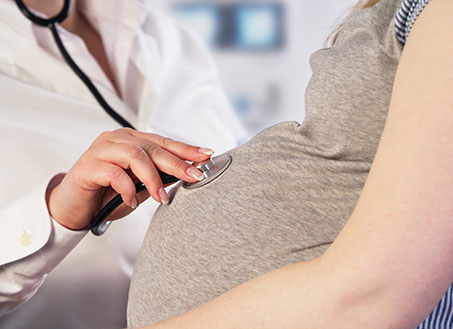 Obstetrics including High Risk Pregnancies
Obstetrics including High Risk Pregnancies
Pregnant women can get best advice for Obstetrics, Ob Gyn & gynecology treatments from obstetricians to ensure safe pregnancy & delivery.
What Obstetrics means?
Obstetrics means caring for pregnant women to ensure safe pregnancy and delivery to ensure a healthy mother and baby. It is the dream of every woman to experience the joy of motherhood and we at Mittal Maternity and Super-specialty Hospital are committed to providing the best experience to aspiring mothers and fathers! We firmly believe that more information about a process leads to better understanding and enjoyment; we have tried to provide a small amount of knowledge here.
Obstetrics is divided into:
1. The antenatal period – This is the period from conception to delivery of the baby. The standard duration is 9 months and 7 days or 40 weeks. In this time the mother’s body gradually adapts to the growing baby inside and gears up for the tough stress of delivery.
2. The intranatal period – This is the time of delivery of the baby to the outside world. It is the shortest of all three periods but is the most stressful to the mother and baby. There is a sudden change in environmental conditions for mother and baby and both need care and support in this time.
3. The postnatal period – After delivery. This period, also known as the puerperium, is the time when the mother’s body returns to its non-pregnant condition, while the baby becomes strong enough to face the outside world. It is a time of rest and contemplation and of mother-baby bonding.
One would hope that a process as natural as pregnancy and delivery should be free from diseases and complications. Alas, as we all know, this is not so. Diabetes, hypertension, anemia, infections, to name a few, all may affect pregnancy. This has given rise to the term ‘High risk pregnancy’.
Both normal and high risk pregnancies need to be suitably monitored to prevent and control any problems. Moreover, the Janani Suraksha Yojna of the Government of India envisages 100% institutional deliveries for all mothers, just for the reason mentioned above. Sometimes these patients require assistance during delivery too in form of forceps, ventouse application or even Caesarian section.
The basic procedure for antenatal care is as follows:
- There should be at least 10 to 12 visits during antenatal period spread over 9 months and more for some high risk pregnancies.
- Blood tests are done to ensure that mother is in best of health to carry safe pregnancy. These include Hb, sugars, infection screen, thyroid screen, etc.
- Ultrasounds at specific intervals to monitor wellbeing and growth of baby.
- Ultrasound and blood tests to exclude genetic diseases and malformations in the baby.
- Appropriate immunizations, supplements
- Diet and other general advise
- Treatment of inter-current problems like urine infection fever etc.
- Surgical intervention for surgical diseases if required
- Timely decision of mode and timing of delivery
